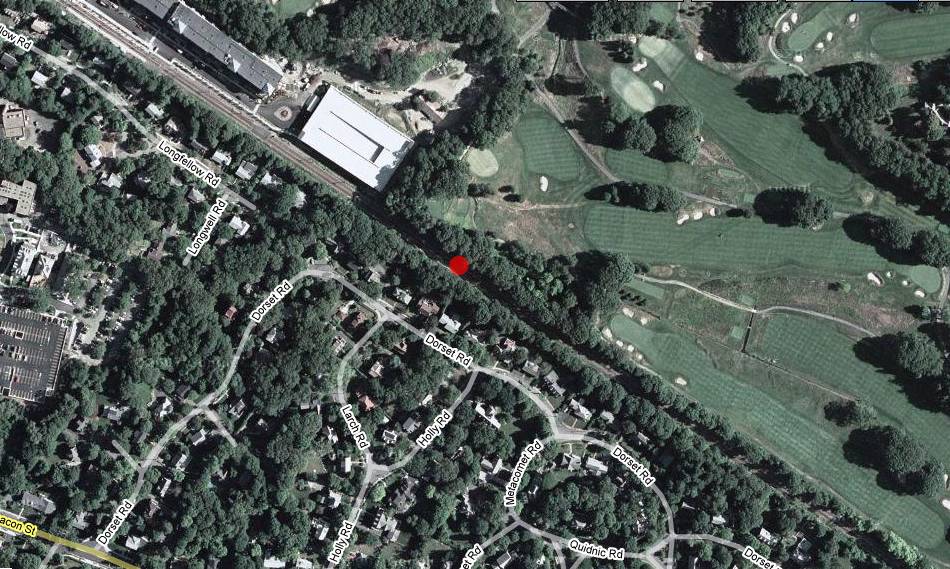This post was written in 2008, never posted, and subsequently forgotten. But it seems pretty relevant still given the recent spate of safety issues on the T, so I might as well publish it.
A few years ago there was a horrible crash on our commuter rail in Boston. One train drove into another that was stopped at a control light before a station. (Below is a map of the rough crash site.) Both were westbound trains, and the crash happened on a straightaway above ground. In other words, it’s hard to find an excuse for it to have happened. These aren’t freight trains. I ride the Green Line all the time, and they can stop very quickly.
Reports show that the driver ran straight through a red light, going four times the proper speed. Eye witnesses on the train have the driver talking on a cell phone at the time of the crash.
This will not be surprising to any regular rider of the MBTA. By and large, the people employed by the T are militantly lazy, uniformly belligerent, and often surprisingly incompetent. I’ve seen operators of the Red Line, supposedly the highest level job in the T, forget which stop they were at and open up the wrong doors at a stop, the ones on the inside of the tunnel where the dreaded third rail is. That could kill a person. As we were watching the Green Line wreckage unfold on local news at a downtown bar (near a Green Line stop, as it happened) the bartender remarked “Given how often those guys come in to get drunk, I’m surprised this hasn’t happened sooner.”
The MBTA is a terribly run organization, expensive and inexcusably unreliable given the fact that Boston is a tiny city with very little distance to cover. We probably have a tenth of the mileage of New York’s transit system (if that), and yet a ride on our little four line subway system costs the same as New York’s massive network. Take a look at Manhattan’s subway and bus system map and then look at ours. It’s hard to believe they cost the same to ride. But the cost could probably be forgiven were it not for the poor management. The T has been around for 52,000 rush hours, and yet they still seem completely taken by surprise by each one. It’s not uncommon for 3-5 trains to go by in rapid succession in one direction while you wait 30 minutes for one to go by in yours, and it’s often too packed to get on. Maybe in another 100 years they’ll figure out how to anticipate demand for their services so the trains don’t all get bunched up during rush hour.
Why is the T so bad? I think one big reason is the corrupt Boston version of union labor. Only in a public union do you get 60k a year to make change and the promise of a fat pension when the company you work for is $14 Billion in the red. And being overpaid is just one benefit. The one that hurts the public even more is the fact that in a really “good” union, doing your job badly isn’t an acceptable basis for termination.
I’m not inherently anti-union. It’s all fine when we’re talking about guys screwing interior panels into Fords. In principle, I think it’s ludicrous they get paid more than college professors, but the fact that we can choose to buy Japanese cars puts a little accountability into the system. (Which the autoworkers unions are finding out as they get laid off by the hundreds of thousands because their cupidity priced the American automotive industry out of existence.) But some situations are ripe for union abuse, and public transportation monopolies are a union organizers dream come true: a captive customer base who have to buy the product, no matter how expensive, for an essential service that renders the threat of a strike hugely effective.
Poor working class folks in Boston who aren’t members of extortionist unions have no alternative to the T. And so when union abuse renders a system so unreliable and yet so expensive that it charges people $2 to ride a Disneyland version of a real subway, ironically it is the working poor who disproportionately suffer the consequences of this experiment in “fair labor.” Are they not just as much deserving of protection as the guys sitting in air conditioned boxes doing nothing because their union contract precludes them from being fired? Who is representing their collective interests from having to pay too much to get to work?
When a union becomes just as much problem for the underclass as anything corporations are doing, let’s just call it what it is: another concentration of power that’s being abused. While unions have historically been forces for fairness, they have now largely grown into legal organized crime, a protection racket run under the threat of strike. How bad will the T have to get before we point the finger at the unions and call them out on their abuses? How bad will public schools have to get before we force accountability on teacher’s unions? How many American industries will have to be priced out of existence? An honest society has to object to any unfair abuse of power, whether it comes from a guy wearing a tie or a blue shirt.
If you are inclined to object, the next time you are sitting on an airplane waiting to take off, think about the fact that the person in charge of your life was promoted to that position for possessing no merit whatsoever other than having stuck around long enough.*
*This doesn’t apply to JetBlue, Southwest, or SkyWest, which are among the few non-union airlines in existence and are also, not coincidentally, just about the only airlines not in bankruptcy or just coming out of it.

